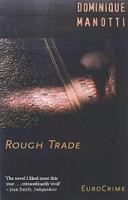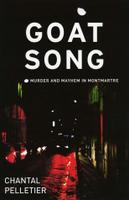
One of the best police/noir novels in recent years is Rough Trade, by Dominique Manotti (Sombre Sentier in the original French). Manotti's novel subverts all the cliche's of the genre, from the personality of the central character, to his love-life, to police procedure, to the logic of the thriller. It's almost impossible to describe the plot without giving something away that's better discovered in the book, but it is possible to mention that Manotti uses history and politics to great effect as the background and atmosphere of the book. Setting the main narrative a decade and a half into the Parisian past, to coincide with an actual event (a strike among the illegal immigrants employed in sweat shops connected to the rag trade), Manotti is able to both evoke that event and that era and also to provide a coda that extends the narrative both literally and emotionally. Turkish immigrants, the Asian drug trade, prostitution, police coercion, homosexuality, labor relations, and much more historical and political material are at the heart of the book, but the plot is nonetheless brisk (almost breathless). Manotti gives us a most unusual and enjoyable experience.
 Chantal Pelletier's Goat Song follows a somewhat enervated detective Marice Laice (there's a joke about his name that is a bilingual French-English pun) through the club culture of Paris and the dark underbelly of real estate speculation and drugs. The book is quite entertaining, and in the end both melancholy and romntic, but not quite up to Manotti's standard, in terms of its impact and its realism or believability.
Chantal Pelletier's Goat Song follows a somewhat enervated detective Marice Laice (there's a joke about his name that is a bilingual French-English pun) through the club culture of Paris and the dark underbelly of real estate speculation and drugs. The book is quite entertaining, and in the end both melancholy and romntic, but not quite up to Manotti's standard, in terms of its impact and its realism or believability.  Jean-Claude Izzo's One Helluva Mess (original French title: Total Kheops, a slang expression that the English title doesn't really capture) is a tour through the underworld of Marseille. Izzo starts off the book with an exiled gangster returning to Marseille with revenge on his mind, and then the book takes a radical turn, focusing instead on a police detective and former friend of the gangster. Izzo's novel is not a straight roman policier, but instead is a dark, almost romantic take on a changing Marseille: in particular it's Algerian subculture in conflict with its more established population of French men and women who were mostly themselves immigrants a generation or two earlier. Izzo's hero moves freely through the diverse communities, though at home in none of them, and his story is engaging. It's tempting to include the police novels of Yasmina Khadra here, since a post-colonial Algeria is the setting and the theme for them, but I'll restrict myself to a couple of comments: Khadra's two books translated into English so far are fast, somewhat fragmented, very sexist, violent portraits of a chaotic, millennial, even apocalyptic social situation in an Algiers that is perched on the edge between a corrupt regime and a ruthless fundamentalist revolt. They evoke a new Battle of Algiers that, in Khadra's portrait, is a ruthless war zone in both literal and moral terms.
Jean-Claude Izzo's One Helluva Mess (original French title: Total Kheops, a slang expression that the English title doesn't really capture) is a tour through the underworld of Marseille. Izzo starts off the book with an exiled gangster returning to Marseille with revenge on his mind, and then the book takes a radical turn, focusing instead on a police detective and former friend of the gangster. Izzo's novel is not a straight roman policier, but instead is a dark, almost romantic take on a changing Marseille: in particular it's Algerian subculture in conflict with its more established population of French men and women who were mostly themselves immigrants a generation or two earlier. Izzo's hero moves freely through the diverse communities, though at home in none of them, and his story is engaging. It's tempting to include the police novels of Yasmina Khadra here, since a post-colonial Algeria is the setting and the theme for them, but I'll restrict myself to a couple of comments: Khadra's two books translated into English so far are fast, somewhat fragmented, very sexist, violent portraits of a chaotic, millennial, even apocalyptic social situation in an Algiers that is perched on the edge between a corrupt regime and a ruthless fundamentalist revolt. They evoke a new Battle of Algiers that, in Khadra's portrait, is a ruthless war zone in both literal and moral terms.  On a far lighter note, the first of Tonino Benacquista's novels to be published in English (there are 2 in English now, but I haven't read the 2nd one yet) is a comic take on the life and trials of a 2nd generation Italian immigrant family in Paris--and the connection of its scion, Benacquista's hero, to the land (literally) of his forefathers. Benacquista takes on the mafia, the church, and the structure of the noir/thriller genre here, with quite enjoyable results. In a later installment on France: Fred Vargas and others.
On a far lighter note, the first of Tonino Benacquista's novels to be published in English (there are 2 in English now, but I haven't read the 2nd one yet) is a comic take on the life and trials of a 2nd generation Italian immigrant family in Paris--and the connection of its scion, Benacquista's hero, to the land (literally) of his forefathers. Benacquista takes on the mafia, the church, and the structure of the noir/thriller genre here, with quite enjoyable results. In a later installment on France: Fred Vargas and others.



